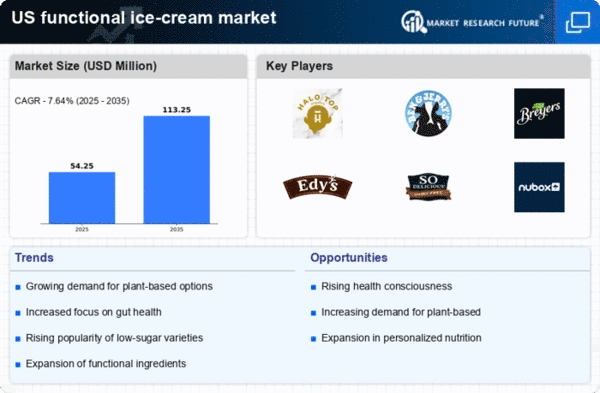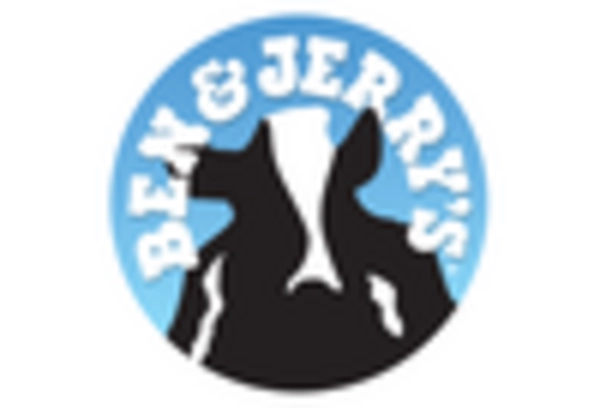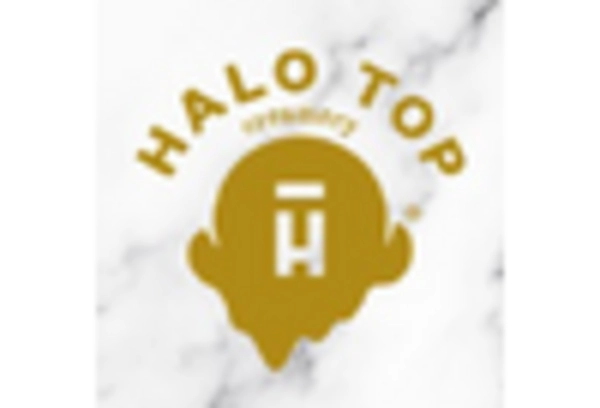Innovative Flavor Profiles
Innovation in flavor profiles is significantly influencing the functional ice-cream market. Consumers are increasingly drawn to unique and exotic flavors that not only satisfy their taste buds but also provide health benefits. Manufacturers are experimenting with ingredients such as superfoods, adaptogens, and herbal extracts to create distinctive offerings. This trend is supported by market data indicating that 45% of consumers are willing to pay a premium for innovative flavors that also deliver functional benefits. As a result, the functional ice-cream market is likely to see a surge in product development focused on flavor innovation, appealing to adventurous consumers seeking new experiences.
Evolving Consumer Preferences
Evolving consumer preferences towards indulgent yet health-conscious treats are shaping the functional ice-cream market. As consumers seek to balance their desire for indulgence with health considerations, there is a growing demand for ice-cream products that provide guilt-free enjoyment. This trend is evidenced by a market analysis indicating that 60% of consumers prefer products that combine taste with health benefits. Consequently, manufacturers are increasingly formulating functional ice-cream that incorporates lower sugar content, natural sweeteners, and added nutrients, aligning with the desires of health-conscious consumers while maintaining indulgent flavors.
Expansion of Distribution Channels
The expansion of distribution channels is a significant driver for the functional ice-cream market. As e-commerce continues to grow, consumers are increasingly purchasing food products online, including functional ice-cream. This shift is supported by data showing that online grocery sales have surged by 25% in recent years. Additionally, traditional retail channels are also adapting by offering more shelf space for functional ice-cream products. This diversification in distribution not only enhances product accessibility but also allows manufacturers to reach a broader audience, thereby fostering growth in the functional ice-cream market.
Rising Demand for Functional Foods
The increasing consumer inclination towards functional foods is a pivotal driver for the functional ice-cream market. As health consciousness rises, individuals are actively seeking products that offer nutritional benefits beyond basic sustenance. This trend is reflected in the market, where functional ice-cream products infused with probiotics, vitamins, and minerals are gaining traction. According to recent data, the functional food sector is projected to grow at a CAGR of approximately 8% over the next five years. This growth indicates a robust opportunity for the functional ice-cream market to cater to health-oriented consumers, thereby expanding its market share and product offerings.
Increased Focus on Dietary Restrictions
The growing awareness of dietary restrictions among consumers is a crucial driver for the functional ice-cream market. With a significant portion of the population adopting gluten-free, dairy-free, and low-sugar diets, there is a rising demand for ice-cream products that cater to these needs. Market Research Future suggests that approximately 30% of consumers actively seek out products that align with their dietary preferences. This shift presents an opportunity for manufacturers to develop functional ice-cream options that are not only compliant with various dietary restrictions but also offer added health benefits, thereby enhancing their appeal in a competitive market.
















